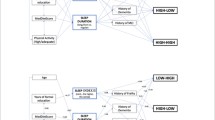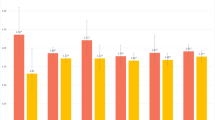Abstract
Against a macro backdrop of accelerating population aging, the mental health and sleep quality of China’s elderly have become subjects of interest because these factors are both closely linked to seniors’ quality of life. Based on multi-period tracking data from the Chinese Longitudinal Healthy Longevity Survey (CLHLS), this study uses a fixed-effects model to examine the correlation between the sleep quality and mental health of China’s elderly and found that: (1) the elderly in China generally had good sleep quality and mental health; (2) better sleep quality has a positive effect on the mental health of the elderly, while better mental health also positively boosts sleep quality of the elderly; and (3) there may be a causal relationship between the sleep quality and mental health of the elderly.

Similar content being viewed by others
References
Chang, P., Ford, D., Mead, L., et al. (1997). Insomnia in young men and subsequent depression: the Johns Hopkins precursors study. American Journal of Epidemiology, 146(2), 105–114.
Chen, C., Li, J., & Wang, J. (2007). The aged sleep quality and related factors among different areas. Chinese Journal of Health Psychology, 02, 188–189.
Ding, L., Wu, B., Zheng, X., Li, L., & Wang, J. (2014). Analyzing the status of mental health of aging population in Shandong Province and its influencing factors. Chinese Health Service Management, 31(12), 948–951.
Dregan, A., & Armstrong, D. (2009). Age, cohort, and period effects in the prevalence of sleep disturbances among older people: the impact of economic downturn. Social Science & Medicine, 69(10), 1432–1438.
Du, M. (2017). Impact of social support on the mental health of the elderly. Journal of Nan**g College for Population Programme Management, 33(04), 12–19.
Du, P., Zhai, Z., & Chen, W. (2005). The elderly population of China: a century-long projection. Population Research, 06, 92–95.
Grandner, M., Patel, N., Gehrman, P., et al. (2010). Who gets the best sleep? Ethnic and socio-economic factors related to sleep complaints. Sleep Medicine, 11(5), 470–478.
Hu, A. (2012). Propensity score matching and causal inference: a review of methodological arguments. Sociological Research, 27(01), 221-242+246.
Jiang, K., & Chen, Y. (2016). Can parent-child living together improve the well-being of the elderly?—Evidence based on CLHLS data. Population Journal, 38(06), 77–86.
Jiang, X., Wei, M., & Zhang, W. (2015). Study on the health status and influencing factors of China’s aging population. Population Journal, 37(02), 46–56.
Li, J., Yao, Y., Dong, Q., et al. (2013). Characterization and factors associated with sleep quality among rural elderly in China. Archives of Gerontology & Geriatrics, 56(1), 237–243.
Li, Q., Xu, W., & Li, L. (2014). Elderly mental health quality and mental health condition: mediating effect of social support. Chinese Journal of Clinical Psychology, 22(04), 688-690+695.
Livingston, G., Blizard, B., & Mann, A. (1993). Does sleep disturbance predict depression in elderly people? A study in inner London. British Journal of General Practice, 43(376), 445.
Lu, J., & Guo, R. (2017). An empirical study on health and health inequality of Chinese elderly: based on regional and community perspective. Population Journal, 39(02), 57–67.
Maurice, M., & Teresa, S. (2010). Prevalence of insomnia and sleep characteristics in the general population of Spain. Sleep Medicine, 11(10), 1010–1018.
Ming, Z., & Chen, Z. (2020). Mental health literacy: Concept, measurement, intervention, and effect. Advances in Psychological Science, 28(01), 1–12.
Peng, L. (2013). Impact of sleep quality on the mental health of in the elderly. Chinese Journal of Gerontology, 33(07), 1622–1624.
Peng, Y. (2011). Causal analyses in social sciences. Sociological Studies, 26(03), 1-32+243.
Quan, D., Li, H., Li, G., Lin, H., & Guo, G. (2008). Correlations of sleep conditions and mental health of the elderly in residential communities. Guangdong Medical Journal, 11, 1894–1896.
Roberts, R., Shema, S., Kaplan, G., et al. (2000). Sleep complaints and depression in an aging cohort: a prospective perspective. American Journal of Psychiatry, 157(1), 81–88.
Rodin, J., Mcavay, G., & Timko, C. (1988). A longitudinal study of depressed mood and sleep disturbances in elderly adults. Journal of Gerontology, 43(2), 45–53.
Ruth, M., & Michael, J. (2008). Insomnia and depression. Sleep Medicine, 9(Suppl 1), S3-9.
Sun, J., & Ji, Y. (2017). The influences of “downward” intergenerational support on mental health of the Chinese elderly: the moderating effects of cognitive evaluation. Population Research, 41(06), 98–109.
Taylor, D., Lichstein, K., Durrence, H., et al. (2005). Epidemiology of insomnia, depression, and anxiety. Sleep, 28(11), 1457–1464.
Vgontzas, A., Julio, F., Bixler, E., et al. (2012). Persistent insomnia: the role of objective short sleep duration and mental health. Sleep, 1, 1.
Xu, Qi. (2018). Living arrangement and depression among the Chinese elderly people: an empirical study based on CHARLS. Sociological Review of China, 6(04), 47–63.
Yu, G., Chen, T., & Zhao, F. (2020). The influence of air temperature and temperature variability on mental health. Advances in Psychological Science, 28(8), 1282–1292.
Yu, J., & **e, Y. (2014). The effect of fertility on women’s wages in China. Population Research, 38(01), 18–29.
Zhai, Z., Chen, J., & Li, L. (2017). Future trends of China’s population and aging: 2015–2100. Population Research, 41(04), 60–71.
Zhu, Q., Jian, W., Yang, L., Wu, Z., Zhuo, L., & Wang, H. (2019). Sleep quality of the Chinese elderly in residential communities and influencing factors. Chinese Journal of Gerontology, 39(03), 606–611.
Funding
This study is funded by the National Strategic Research on the Active Response to Population Ageing (20ZDA32), a major project planned by Bei**g Municipal Social Science Foundation.
Author information
Authors and Affiliations
Corresponding author
Ethics declarations
Conflict of interest
The authors state that there is no conflict of interest.
Rights and permissions
About this article
Cite this article
Lu, J., Liu, K. Sleep quality and mental health of the elderly in China: evidence from longitudinal data. China popul. dev. stud. 5, 378–393 (2021). https://doi.org/10.1007/s42379-021-00096-4
Received:
Accepted:
Published:
Issue Date:
DOI: https://doi.org/10.1007/s42379-021-00096-4




